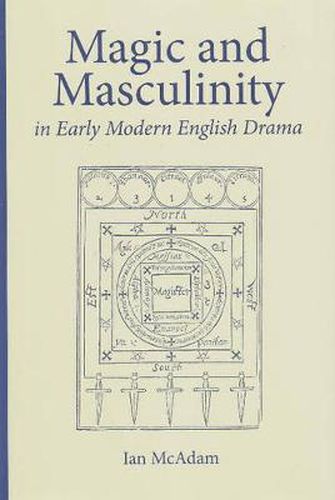Readings Newsletter
Become a Readings Member to make your shopping experience even easier.
Sign in or sign up for free!
You’re not far away from qualifying for FREE standard shipping within Australia
You’ve qualified for FREE standard shipping within Australia
The cart is loading…






The prevalent worldview of early modern England, clearly shaped by Protestantism, dismissed magical belief as an ideological delusion inherent in Catholicism. That same Protestantism encouraged a strong sense of individualism, with its emphasis on self-transformation, through which a new masculinity found expression. Why, then, did magical self-empowerment retain such a hold on the artistic and cultural imagination of early modern English society? Ian McAdam’s innovative study suggests that the answer to this question may lie partly in an increasingly ironic presentation of magic. While the magical beliefs of the period asserted, on the one hand, individual empowerment through a quasi-religious self-justification and a presumed mastery of the objective world, those beliefs also gave rise to various anxieties concerning power and control – anxieties that created difficulty with conceptions of masculine and feminine gender roles as well as cultural attitudes toward Nature and the natural. Thus, McAdam contends, the increased interest in magic was connected to a crisis in masculine identity, which was exacerbated by the Protestant Reformation and its concern with individual empowerment as well as class, sexual, and religious identifications. Moreover, as artistic presentations – especially in the theater – were concerned with magic as a form of psychological, ideological, and cultural control, the study finds the psychoanalytic concept of narcissism useful in explaining the notion of selfhood as it developed in early modern England. In chapters that explore various literary texts, McAdam considers depictions of magic by tracing a chronological path that follows a dialectical struggle involving a precarious attempt to balance supra-rational and sub-rational impulses. Beginning with Greene’s Friar Bacon and Friar Bungay, which depicts some ambivalent attitudes toward magical self-empowerment and the cultural concern of a feminine sexual threat to masculine (magical) control, the book moves to the Calvinist constructions of manhood in Marlowe’s Doctor Faustus and eventually to considerations of male self-definition and its reliance on women, class considerations in more oblique magical contexts, and surrender to magical (and ideological) powers in the works of Shakespeare, Marston, Middleton, Chapman, and Jonson. In addition to appealing to those who study early modern Literary Studies and drama, this book will interest scholars of gender and those concerned with the theological basis of human subjectivity in the Renaissance.
$9.00 standard shipping within Australia
FREE standard shipping within Australia for orders over $100.00
Express & International shipping calculated at checkout
The prevalent worldview of early modern England, clearly shaped by Protestantism, dismissed magical belief as an ideological delusion inherent in Catholicism. That same Protestantism encouraged a strong sense of individualism, with its emphasis on self-transformation, through which a new masculinity found expression. Why, then, did magical self-empowerment retain such a hold on the artistic and cultural imagination of early modern English society? Ian McAdam’s innovative study suggests that the answer to this question may lie partly in an increasingly ironic presentation of magic. While the magical beliefs of the period asserted, on the one hand, individual empowerment through a quasi-religious self-justification and a presumed mastery of the objective world, those beliefs also gave rise to various anxieties concerning power and control – anxieties that created difficulty with conceptions of masculine and feminine gender roles as well as cultural attitudes toward Nature and the natural. Thus, McAdam contends, the increased interest in magic was connected to a crisis in masculine identity, which was exacerbated by the Protestant Reformation and its concern with individual empowerment as well as class, sexual, and religious identifications. Moreover, as artistic presentations – especially in the theater – were concerned with magic as a form of psychological, ideological, and cultural control, the study finds the psychoanalytic concept of narcissism useful in explaining the notion of selfhood as it developed in early modern England. In chapters that explore various literary texts, McAdam considers depictions of magic by tracing a chronological path that follows a dialectical struggle involving a precarious attempt to balance supra-rational and sub-rational impulses. Beginning with Greene’s Friar Bacon and Friar Bungay, which depicts some ambivalent attitudes toward magical self-empowerment and the cultural concern of a feminine sexual threat to masculine (magical) control, the book moves to the Calvinist constructions of manhood in Marlowe’s Doctor Faustus and eventually to considerations of male self-definition and its reliance on women, class considerations in more oblique magical contexts, and surrender to magical (and ideological) powers in the works of Shakespeare, Marston, Middleton, Chapman, and Jonson. In addition to appealing to those who study early modern Literary Studies and drama, this book will interest scholars of gender and those concerned with the theological basis of human subjectivity in the Renaissance.